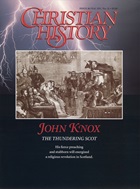The command to love one’s neighbor does not require one to like one’s neighbor. That subtle distinction has helped me weather many a relationship. It’s also helped me get through this issue on John Knox.
I found Knox difficult to like. Knox could be arrogant, proud, stubborn, and cantankerous. He called Catholic Queen Mary I of England, to put it in modern parlance, “a freak of nature.” The universally acclaimed beauty of Cranmer’s Book of Common Prayer Knox described as a “mingle-mangle.”
One man standing before Knox’s open grave said it as diplomatically as possible: “Here lies a man who neither flattered nor feared any flesh.”
Of course, tact is not a gift usually lavished on a prophet, which is the best way to understand Knox. He was a Hebrew Jeremiah set down on Scottish soil—in a relentless campaign of fiery oratory, he sought to destroy idolatry and purify national religion. In the end, his cause triumphed.
Purifying religion I like. But the man? Then again, I don’t care much for prophetic types. Had I lived in their days, I would have dismissed Jeremiah as a whiner and John the Baptist as eccentric. This dislike of outspoken and decisive heralds is no doubt a serious character flaw on my part.
On the other hand, whether I happen to like this historical figure or that, well, that’s a modern eccentricity. For Knox and Jeremiah and John, the issue was not whether someone was likable, but whether he or she stood on the side of truth.
I don’t agree with all of Knox’s assessments and actions, but ultimately Knox was on the right side. For that, for his raw courage and tenacity, and for his legacy—Scottish, American, and world-wide Presbyterianism—we honor him.
Copyright © 1995 by the author or Christianity Today/Christian History magazine.
Click here for reprint information on Christian History.

Support Our Work
Subscribe to CT for less than $4.25/month




























